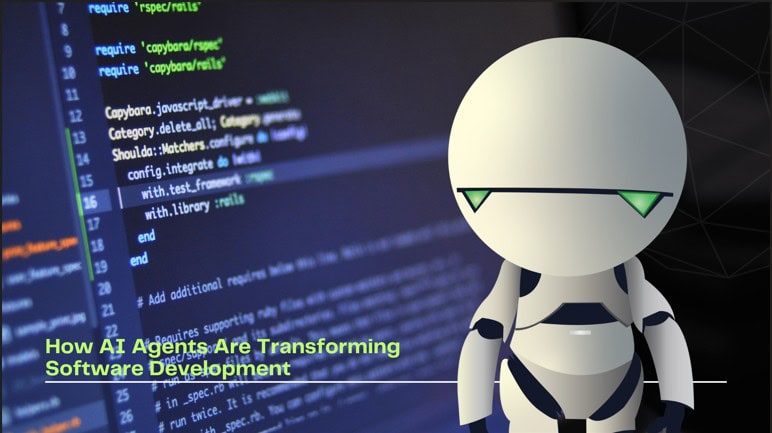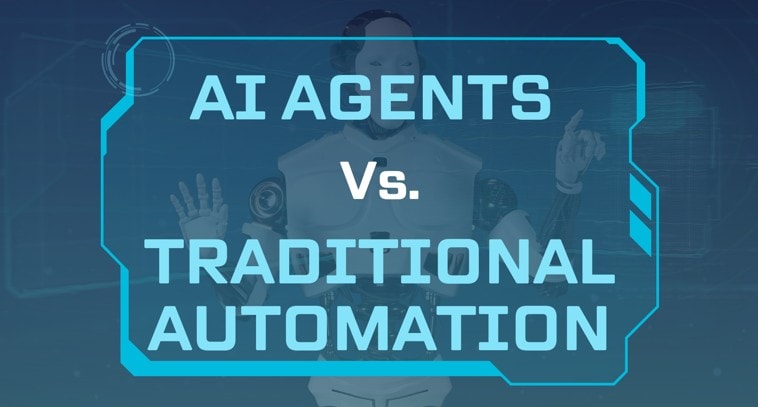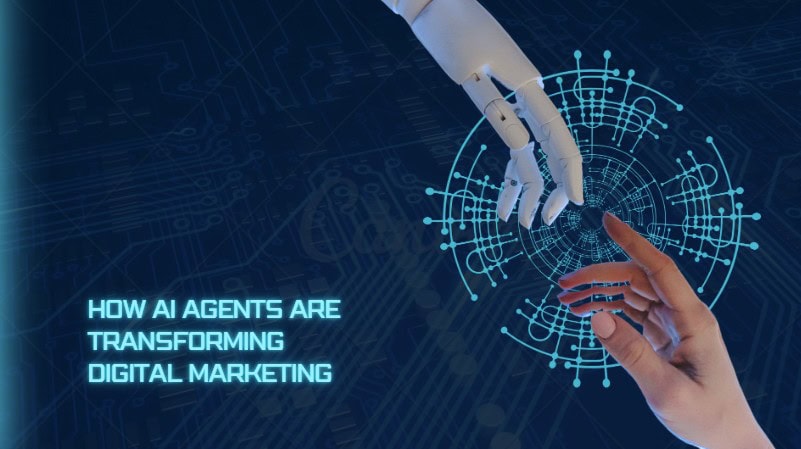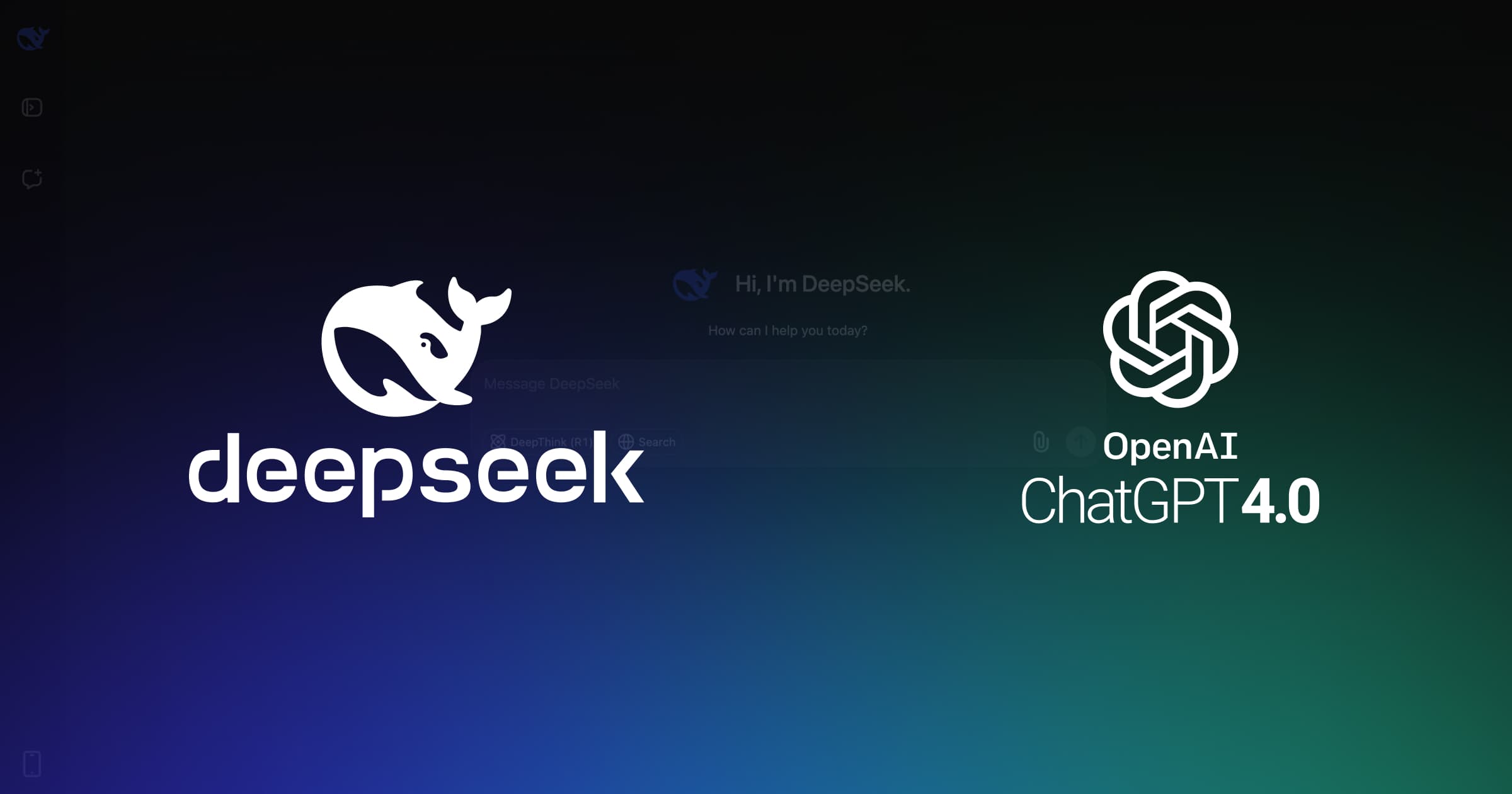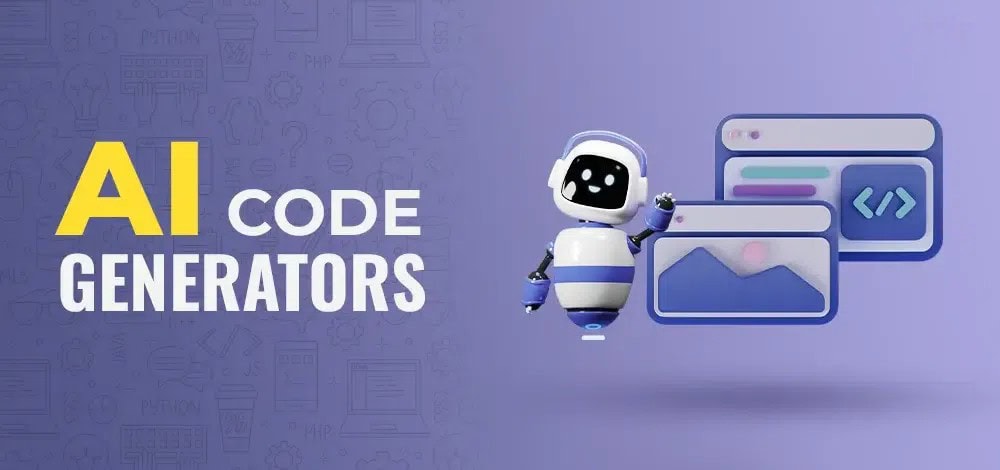The dynamic landscape of the marketing industry undergoes continuous transformations, with new methodologies and technologies emerging daily. A particularly promising advancement is the integration of generative AI into marketing practices.
While traditional marketing heavily relies on machine analysis and human foresight, generative AI introduces a paradigm shift by combining machine speed with super-human predictive capabilities. This swiftly advancing technology can automate various aspects of marketing, including content generation, design, and strategy, using algorithms and machine learning to offer a glimpse into the unfolding future of marketing.
As generative AI and generative attribution technologies reshape marketing dynamics, spanning personalized content creation to predictive analytics, staying abreast of these innovations becomes imperative for maintaining competitive branding.
This blog aims to facilitate that understanding by digging into the profound impact of generative AI on the marketing industry and its implications for the future of marketing.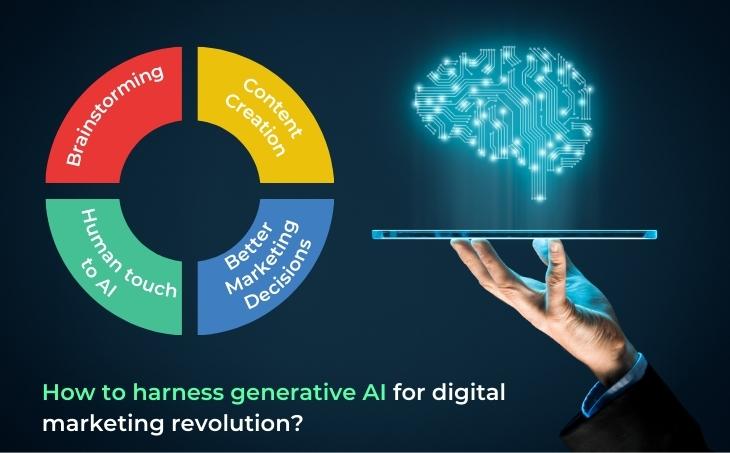
What is Generative AI?
Generative AI is a category of artificial intelligence systems designed to generate new content, such as images, text, audio, or other data types, that is not explicitly programmed into the system. Unlike traditional AI systems that rely on rule-based programming or supervised learning, generative AI operates using unsupervised learning and often involves neural networks.
At its core, generative AI leverages algorithms and models to understand patterns and structures within existing data. It then uses this understanding to generate new, original content that is similar to the input data. This ability to create novel and contextually relevant content is what sets generative AI apart.
There are various types of generative AI models, including:
- Generative Adversarial Networks (GANs): GANs consist of two neural networks, a generator, and a discriminator, which are trained simultaneously. The generator creates content, and the discriminator evaluates it. This adversarial process results in the generation of high-quality, realistic data.
- Recurrent Neural Networks (RNNs) and Long Short-Term Memory (LSTM): These are types of neural networks that are particularly effective for sequential data, making them suitable for tasks like text generation or language modeling.
- Transformer Models: Transformer models, such as OpenAI’s GPT (Generative Pre-trained Transformer), have gained popularity for their ability to generate coherent and contextually relevant text. These models are pre-trained on vast datasets and can be fine-tuned for specific tasks.
Generative AI finds applications in a wide range of fields, including content creation, image synthesis, natural language processing, and even in creative endeavors like art and music generation.
However, ethical considerations and potential misuse, such as the creation of deepfakes, are also areas of concern associated with the development and deployment of generative AI technologies.
How Does Generative AI Work?
Generative AI has a history dating back to the 1960s. Despite the common association of AI with GPT-based models, its scope extends beyond that and revolves around using computers to autonomously generate novel and distinctive data. This can consist of various elements, such as sentences, images, consumer touchpoint journeys, and more. While contemporary discussions often center on applications based on GPT, it is crucial to acknowledge the expansive scope and potential of this technology.
Generative AI works by employing advanced algorithms and models to autonomously generate new, original content. The specific mechanisms can vary based on the type of generative AI model, but here’s a general overview of how it typically operates:
- Data Training: Generative AI models are trained on large datasets that contain examples of the type of content they are meant to generate. For instance, a text-based generative AI model might be trained on a massive corpus of text, while an image generator would be trained on a vast collection of images.
- Learning Patterns: During the training process, the generative AI model learns patterns, structures, and relationships within the input data. This involves capturing the statistical properties and features that define the dataset.
- Model Architecture: Different types of generative AI models have distinct architectures. For example, Generative Adversarial Networks (GANs) consist of a generator and a discriminator network that is trained in opposition, while transformer models like GPT use attention mechanisms to understand the context and generate coherent sequences.
- Generating New Content: Once trained, the generative AI model can generate new content by extrapolating from the patterns it has learned. For instance, a text-based model might produce coherent and contextually relevant sentences, an image generator might create new images, and so on.
- Fine-Tuning (Optional): In some cases, generative AI models can be fine-tuned for specific tasks or domains. This involves training the model on a more specific dataset to tailor its output to a particular context or goal.
Here are a few examples of how generative AI is applied in different domains:
- Text Generation: Models like GPT can generate human-like text passages, articles, or even dialogue based on the input they receive.
- Image Synthesis: GANs are commonly used for generating realistic images, and they have applications in creating artwork and faces or even altering and enhancing photographs.
- Music and Art Creation: Generative AI can also be used to compose music, generate art, and produce creative content.
Mastering Holiday SEO Optimization: Strategies for Seasonal Success
What are the Applications of Generative AI?
Generative AI finds diverse applications across various industries, with some of its notable uses including:
-
Efficient Data Analysis and Predictive Modeling
Generative AI algorithms excel in swiftly processing and analyzing extensive datasets. Their speed and accuracy surpass traditional methods, allowing marketers to discern patterns, trends, and correlations that might be challenging or even impossible to identify otherwise.
Moreover, these algorithms contribute to predictive modeling by leveraging vast datasets, including historical information. This capability enables organizations to anticipate future trends and outcomes, helping them to proactively address challenges and capitalize on opportunities.
-
Personalized Content Creation
Generative AI empowers marketers to effortlessly create content tailored to individual preferences, interests, and needs. Whether it involves generating personalized product recommendations, crafting customized emails, or creating targeted advertisements, this technology enables marketers to deliver content that resonates with their audience on a personal level. The result is heightened user engagement, increased conversions, and enhanced brand loyalty.
-
Recovered Consumer Journeys
Generative AI has brought about a transformative shift in data analysis, facilitating the retrieval of consumer journeys that were previously obscured due to missing data. The insights derived from these recovered customer journeys offer valuable information about consumer behavior and preferences. By unveiling hidden patterns and trends in consumer journeys, generative AI provides access to previously inaccessible insights.
-
Improved Customer Experience with Chatbots
Chatbots powered by generative AI elevate the customer experience by delivering immediate and personalized assistance. These bots possess the ability to comprehend natural language and context, engaging in conversations that closely mimic human interactions and delivering precise responses. Marketers leverage these chatbots to offer round-the-clock customer support, efficiently address inquiries, and ensure seamless interactions.
-
Precision in Targeted Advertising and Recommendation Systems
Generative AI algorithms help advertisers to quickly analyze extensive datasets, gaining insights into consumer preferences, interests, and behavioral patterns. This understanding enables the creation of customized advertisements that resonate with the specific audience, resulting in heightened conversion rates and improved marketing return on investment (ROI).
Additionally, generative AI drives recommendation systems, which analyze user data to provide personalized suggestions based on individual preferences and past behavior. This not only enriches the user experience but also boosts engagement and drives sales.
Democratized Data
The absence of technical proficiency can pose a substantial challenge for marketing teams when dealing with data quality analysis. Fortunately, generative AI has eradicated this hurdle. Marketing teams no longer require the expertise of data scientists or IT professionals to access and interpret data.
Generative AI tools help marketers to swiftly comprehend and use data for informed decision-making. This democratization of data enhances the efficiency and effectiveness of marketing campaigns, enabling teams to accurately target their audience, optimize content, and personalize customer experiences.
What are the Benefits of Generative AI in Marketing?
In the realm of marketing, generative AI presents numerous advantages that can significantly elevate advertising and promotional endeavors. Some key benefits of Generative AI in marketing include:
-
Increased Efficiency and Productivity
Generative AI serves as a valuable tool for marketers, automating labor-intensive tasks and processes. This automation enables marketing teams to focus on the strategic and creative aspects of their business while mitigating the impact of human errors on data quality.
The technology streamlines and enhances the creation of personalized and targeted content on a large scale. By leveraging generative AI, companies can optimize their marketing endeavors, refine campaigns, and efficiently reach their intended audience.
-
Cost-Efficient Marketing Approaches
Using generative AI technologies enables marketers to automate and optimize various facets of their campaigns, minimizing the reliance on manual labor and streamlining processes. This automation not only saves time but also reduces costs associated with traditional marketing methods.
Generative AI analyzes data, discerns patterns, and generates personalized marketing content, enhancing the precision and effectiveness of campaigns. The cost-effectiveness inherent in these strategies allows marketers to allocate resources efficiently, leading to improved returns on their marketing investments.
-
Improved Customer Engagement and Satisfaction
Generative AI is adept at analyzing data to gain a deeper understanding of customer behavior and preferences. This insight allows marketers to tailor their strategies accordingly. The technology facilitates personalized recommendations, targeted advertising, and interactive experiences, establishing a more profound connection with customers and fostering higher levels of satisfaction.
-
Continuous Learning Capabilities
Generative AI algorithms continually enhance their understanding and adaptability by accessing an expanding pool of data over time. Through learning from user interactions and feedback, these AI systems consistently refine their capabilities, offering increasingly accurate and personalized solutions to cater to individual customer needs.
What Strategies Are Most Effective in Implementing Generative AI for Marketing?
Implementing generative AI in marketing needs meticulous planning and consideration of optimal strategies. Let’s explore the most effective approaches for deploying generative AI in marketing.
-
Clearly Define Marketing Goals
Clearly articulating marketing goals involves pinpointing specific objectives, such as enhancing brand awareness, improving customer engagement, or boosting sales. Well-defined goals serve as the foundation for aligning generative AI strategies with your overarching data-driven marketing plan. This clarity not only guides the implementation process but also ensures the efficient utilization of AI technology to achieve marketing objectives.
-
Identify Relevant Data Sources
Determining relevant data sources entails identifying the types of data that will be most beneficial. These sources may consist of customer demographics, purchasing behavior, social media interactions, website analytics, and more. Marketers should leverage these pertinent data sources to train generative AI models with accurate and valuable information, thereby enhancing the effectiveness of marketing initiatives.
-
Assess and Improve Generated Marketing Content
Generative AI proves advantageous to marketers by automating the creation of marketing content. This process involves analyzing metrics such as engagement, click-through rates, and conversion rates. Continuous evaluation and optimization amplify the impact of generative AI in marketing campaigns.
-
Train and Refine Generative AI Models Using Acquired Data
A highly effective approach involves training and fine-tuning generative AI models using collected data, consisting of pertinent information from customer interactions, market trends, and historical marketing campaigns. Marketers can enhance the personalization and efficacy of marketing materials by iteratively refining the model. The trained model is then capable of generating content, such as ads, social media posts, and email campaigns, that resonates with the target audience.
-
Give Priority to Security Measures
Marketers must ensure that the AI tool integrates essential security measures to safeguard sensitive data. Allowing unrestricted data uploads to platforms like ChatGPT or other open-source tools poses a potential risk of exposing confidential information. Hence, a thorough evaluation of the security protocols of the AI tool is crucial to guarantee the secure handling of proprietary data.
-
Select the Optimal Generative AI Tool
The adoption of new technologies in the marketing industry should be approached with a critical eye, ensuring that they genuinely address specific challenges. Marketers are advised to exercise caution and avoid following trends blindly. Instead, they should assess whether a particular generative AI technology aligns with their goals and enhances their products or campaigns.
What Challenges and Possible Risks Does Generative AI Present?
As AI systems advance, becoming increasingly adept at generating realistic content, challenges emerge concerning the potential misuse of this technology for alternative purposes. Some of the challenges and risks associated with generative AI are outlined below:
-
Dependence on Representative Data in Model Training
A significant challenge lies in the dependence on representative data for model training. Similar to humans, AI models learn from their environment, and if trained on biased or limited data, they will mirror those biases and limitations in their output. Inaccurate representation of the real world in training data can result in skewed or erroneous results. An AI model possesses restricted knowledge, comprehending only what it has been programmed to learn.
-
Organizational Readiness
While some applications of Generative AI may be relatively simple and demand low levels of readiness, tackling more complex problems requires meticulous consideration of various factors. Privacy, legal, regulatory, and ethical concerns all become significant considerations when dealing with advanced applications of Generative AI.
-
Mimicry vs. Independent Intelligence
Generative AI has garnered attention for its capacity to emulate human intelligence and produce seemingly autonomous responses. However, it’s important to recognize that despite its impressive capabilities, it functions more like a highly skilled parrot. It interprets context and responds accordingly, yet it lacks true independent intelligence. Instead of replacing humans, it serves as a tool to enhance and amplify human abilities.
-
Legal and Regulatory Hurdles
Numerous companies operating in heavily regulated industries exhibit hesitation in fully embracing AI, primarily due to apprehensions about the absence of established legislation and regulations governing its use. Adopting a cautious approach, these companies await the formulation of clear guidelines before fully integrating generative AI technologies.
-
Privacy and Data Security Challenges
As generative AI models derive insights from extensive datasets, a noteworthy concern in terms of data privacy revolves around the possibility of inadvertently incorporating sensitive or private information into the generated content. This poses a potential risk of exposing personal data or generating misleading and harmful content.
-
Ethical Considerations
A prominent challenge lies in the potential for misuse or malicious intent associated with generative AI. Given its ability to create realistic and convincing content, there is a risk of using it to propagate misinformation, generate fake news, or even create deceptive videos with the intent to deceive or manipulate individuals.
Additionally, concerns exist about potential copyright infringement when using generative AI to produce content resembling existing works.
What is the Future of Marketing with Generative AI?
As AI in marketing progresses, marketers gain improved capabilities to construct and refine models with greater efficiency. They can achieve a more precise understanding of consumer journeys and extract valuable insights with enhanced accuracy.
The integration of generative AI enables marketers to streamline the feedback loop, enabling swift and well-informed actions based on the specific interests and behaviors of each consumer. This transcends conventional targeting and retargeting methods, facilitating the creation of bespoke content tailored to the unique preferences and probabilities of individual clients.
Furthermore, the potential is substantial for marketers armed with extensive CRM datasets. Beyond traditional segmentation, marketers can personalize promotions and pricing for each individual consumer. This heightened level of customization empowers marketers to target their audience more effectively, delivering personalized experiences that deeply resonate with consumers.
In Conclusion
Generative AI stands poised to transform the marketing landscape, offering inventive solutions capable of elevating customer experiences and fueling business expansion. Through the use of Generative AI, marketers can harness the potential of generative attribution to refine strategic campaigns, optimize audience targeting, comprehend customer journeys leading to conversion, and enhance overall attribution effectiveness.
Would you like to read more about “The Revolutionary Impact of Generative AI on Future of Marketing” related articles? If so, we invite you to take a look at our other tech topics before you leave!
Use our Internet marketing service to help you rank on the first page of SERP.




